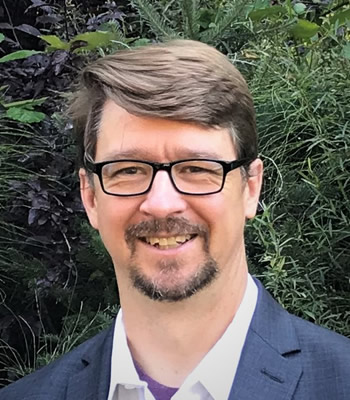This story originally appeared in Lawyer, Fall 2018.
 The question had been bouncing around in the back of David Andrews's mind for more than a year: how can police departments manage their officers' body camera footage in a way that satisfies both watchdog groups and investigators? The challenge is that police need to keep video confidential until investigations are complete, while groups such as the ACLU want immediate access to prevent police tampering.
The question had been bouncing around in the back of David Andrews's mind for more than a year: how can police departments manage their officers' body camera footage in a way that satisfies both watchdog groups and investigators? The challenge is that police need to keep video confidential until investigations are complete, while groups such as the ACLU want immediate access to prevent police tampering.
The answer he came up with — using the shared digital ledger known as blockchain along with sophisticated encryption technology — was named the Seattle winner of the Global Legal Hackathon this spring, one of 40 regional winners from around the world. The hackathon drew some 5,000 participants in 22 countries; the local competition was hosted by Microsoft and Davis Wright Tremaine.
His project — dubbed "Watchman" — uses blockchain to insert a secure digital mark called a "hash" at regular intervals in the police video. Watchdog groups would share access to that digital ledger even before the video is released to the public, so they'd know if the video had been altered.
For Andrews, a software developer turned lawyer, the project was right in his wheelhouse — solving a legal problem in a socially thoughtful way by using the best tools technology has to offer. "I wouldn't have chosen this project but for the great grounding in social justice that I received while at Seattle U," he said.
Andrews is a 2007 graduate of Seattle University School of Law who had spent 10 years at Microsoft before law school writing code for high-profile projects such as the Windows operating system and the popular video game Age of Empires. His law degree allowed him to transition to patent analysis and, later, management positions. He first learned about hackathons while working as a patent attorney for Microsoft Garage, an initiative designed to foster grassroots innovation within the company.
Hackathons are tech-centric events in which people with various skill sets come together for a finite period of time (from a few hours to a few days), form teams, and sprint to create apps or programs that solve particular problems. For example, Seattle University School of Law hosted a hackathon in 2015 with a focus on increasing access to legal services among low-income clients.
"The nature of a hackathon is that you get to try something you haven't tried before," Andrews said. "You get to do stuff that isn't part of your day job."
Andrews served as the legal expert for Microsoft's first company-wide hackathon in 2014, where he fielded all sorts of questions from competitors. One memorable hacker wanted to convert all sales to bitcoin to avoid taxes. (Andrews's answer: sorry, no, that's tax evasion.)
From a participant's perspective, Andrews said his legal education — specifically, the law school's renowned Legal Writing Program — gave him a distinct advantage at hackathons. After all, presenting an argument before a panel of judges is a lot like a trial.
"Lawyers bring a superpower to hackathons and that's the ability to communicate," he said. "When I had success with hackathon judges, it was because I could communicate very effectively what I did, why I did what I did, and how it would change the world."
Andrews, who teaches self-defense classes to vulnerable populations, sees the body camera project as part of his ongoing efforts to make the world a safer place. Watchman does that by promoting transparency in police interactions with the communities they serve.
The project didn't make it to the final round of the hackathon, but Andrews has applied for a patent and may market the idea to body camera companies.
When he's not competing in hackathons, Andrews has built an impressive career combining his tech savvy and legal skills. He left Microsoft two years ago to form his own company, called Legal Analytics, where he applies data science to the field of patents.
His specialty is data visualization. For example, he created color-coded graphs of patent costs, combined with the likelihood that those patents will be granted, to easily identify patents that are most cost-effective to pursue.
"Easy-to-learn software makes data visualization an accessible tool for lawyers, and every lawyer should have some exposure to visualization techniques," he said. "A compelling visual depiction of lost profits in a patent case, for example, could lead to a much higher jury award than a confusing spreadsheet."
Law school classmate Jake Bernstein '07, cybersecurity counsel at Newman Du Wors, said Andrews's career shows what's possible when lawyers embrace technology. "A good lawyer with technical ability can create client value in entirely novel ways," he said. "From discovery to case law research to predicting how a judge will rule on a given motion, the ability to harness the enormous amount of data that's out there will give lawyers tools the previous generation could never have dreamed of."
In the end, Andrews said, a lawyer's storytelling ability becomes the critical human skill a machine can never replace.
"People who compile data tend to be scientists, and even scientists say visualization is really a persuasive endeavor, not a scientific endeavor," he said. "Lawyers have to tell that story. You have to make the story central to all your visualizations."
